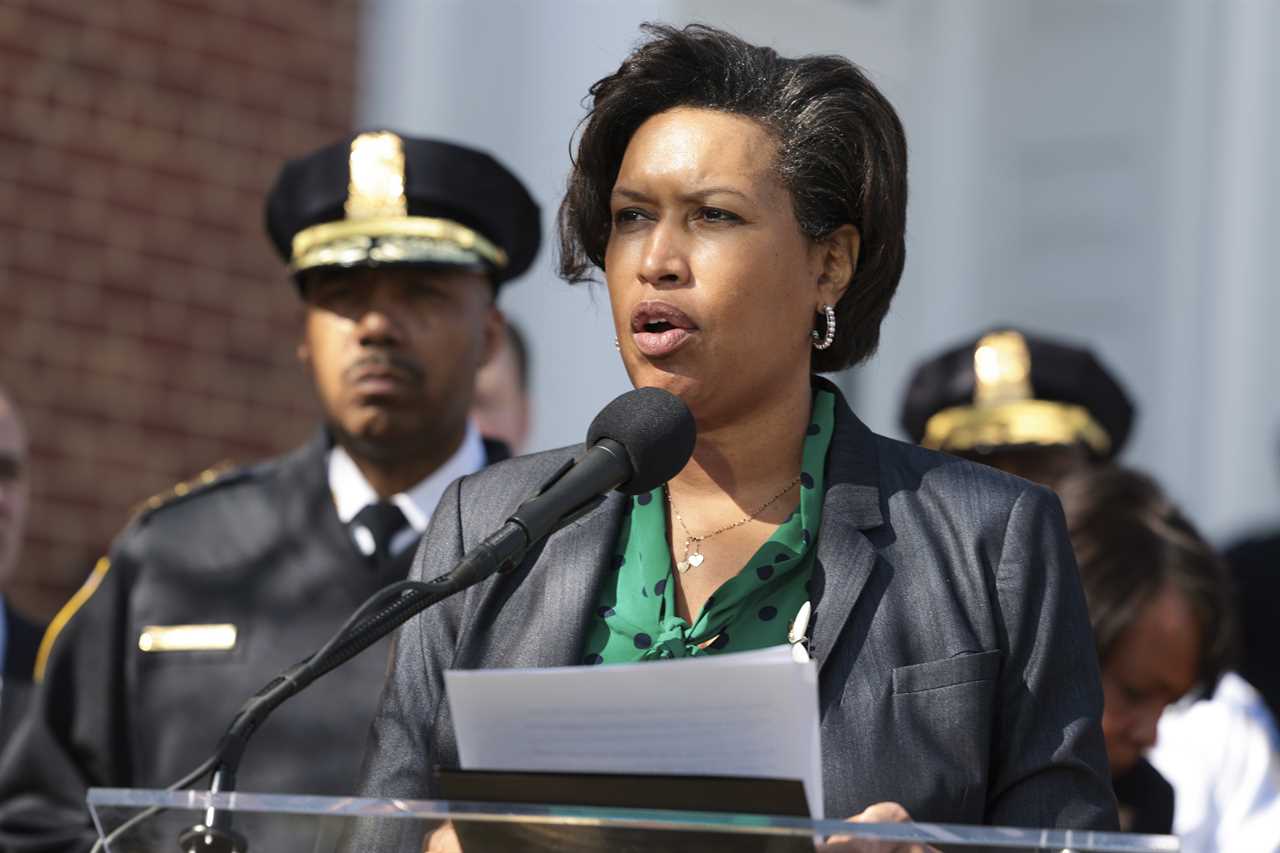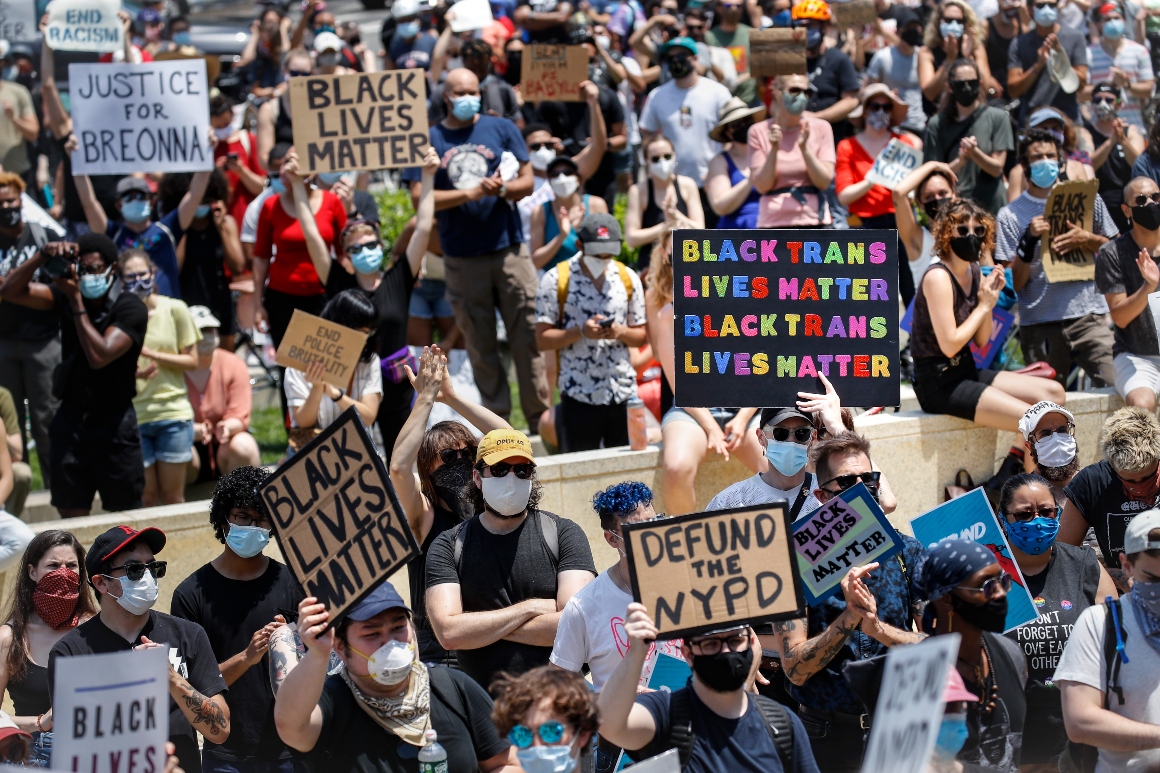
President Joe Biden is proclaiming that it’s time to “fund the police” and pouring more money into law enforcement in his budget plan. Democratic mayors in deep-blue cities are promising to hire hundreds more cops. Even in liberal bastions like Los Angeles, candidates are sprinting to claim the tough-on-crime mantle.
If 2020 was the year progressives reordered the traditional politics of crime and policing, 2022 looks like the year centrists are regaining their footing and nullifying those gains.
Two years ago, the police murder of George Floyd in Minneapolis sparked calls from progressive activists to strip funding from cops, eliminate cash bail and make other sweeping changes to criminal justice policy. Black Lives Matter protesters succeeded in pushing the conversation leftward, leading cities to flatten or even reduce resources for police.

That was then. Now, an uptick in homicides across the country is upending those advances, representing a setback for the left in the ongoing war between the Democratic Party’s centrist and progressive wings.
“Undoubtedly, there’s been a backlash,” said Maurice Mitchell, a leader in the Movement for Black Lives coalition and national director of the left-wing group Working Families Party. “Historically, whenever there's been large social movements, at some point after that you experience some form of backlash. And we’re in the midst of that.”
The signs of the Democratic Party’s evolution on crime are everywhere — and go beyond defeats suffered by the “defund the police” movement in Minneapolis and elsewhere last year. As the midterm elections pick up, Democrats are calling for more police funding and attempting to co-opt traditionally Republican talking points on crime.
“A lot of electeds are really running away from this term,” said Leili Fatehi, a Democratic strategist in Minneapolis who ran the campaign against a failed measure to overhaul the city’s police department last fall.
In Philadelphia, where Floyd’s murder prompted the city council two years ago to reject Democratic Mayor Jim Kenney’s request for a $19 million increase in police spending, top lawmakers this year are asking for millions more for cops. That’s on top of the $24 million boost to the police budget that Kenney has already proposed.
In New York City, Eric Adams, the former NYPD captain and pro-police Democratic mayor, is clearing out homeless camps, drawing comparisons to the city’s former Republican mayor, Rudy Giuliani. Democrats in New York state have also recently agreed to a deal to roll back bail reform after passing it just a few years ago, at which time it was hailed as a national success story combating mass incarceration.
In Nevada, Democratic Sen. Catherine Cortez Masto, a former state attorney general and top target of Republicans seeking to flip the Senate, is reminding voters she has “worked closely with law enforcement” and is “supporting our police.”
Washington, D.C., where the city council cut the police budget in 2020 over Democratic Mayor Muriel Bowser’s objections, is the scene of one of the most glaring reversals: Bowser is proposing hiring hundreds more cops, and now most councilmembers said they are likely on board.
Philadelphia City Councilmember Cherelle Parker, a Democrat and potential 2023 mayoral candidate, said her constituents are calling for more police resources amid an uptick in murders. She recently wrote an op-ed in the Philadelphia Inquirer advocating for 300 more community police officers.
“There is a demand, if you’re listening to the people,” she said. “They want us to fix this seemingly intractable problem, and they want to do it with a sense of urgency.”
She added that many people in the city are forced to make a “determination about whether or not they will allow their children or grandchildren to walk to the corner store.”
Even left-wing Philadelphia District Attorney Larry Krasner — a leading figure in the criminal justice reform movement — attended a news conference held by Parker about her plan, though his spokesperson said he “has consistently called for a modern and effective approach to policing that uses more targeted resources for law enforcement,” and “[a]ll funding for public offices must come with accountability.”
In Los Angeles, a heavily Democratic city where leaders shifted funding away from the police department following Floyd’s murder, Democratic mayoral candidates at a debate last month only disagreed about who would do more to bolster public safety.
Rick Caruso, the billionaire real estate developer who has called for adding 1,500 police officers to the Los Angeles Police Department and who is now running neck-and-neck with Rep. Karen Bass, said, “I … stand with our president, Joe Biden, who said, ‘Let’s fund the police.’”
Joe Buscaino, a current council member, said, “One of my first actions as mayor is going to be to re-fund the LAPD $150 million.” Citing “mayhem and chaos” in Los Angeles, the former police officer said, “I’m the only candidate on this stage who actually wore an LAPD badge and wore a bulletproof vest.”
The adoption of firmer postures on law and order come after a spike in murders nationally in recent years, including in some of the nation’s largest, most heavily Democratic cities. The change of tone also comes in anticipation of attacks from Republicans about “defund the police” in this year’s midterm elections. After Democrats underperformed expectations in House races in 2020, many in the party blamed the broadsides from the GOP.
“As dumb as we are, we do listen to the base. The base has been giving it to us left and right: ‘What do you mean, cutting police?’” said former Pennsylvania Gov. Ed Rendell, who served two terms as Philadelphia mayor. “Go into North Philadelphia, where 99 percent of the people are African American, and ask them what they think of defunding the police. You wouldn’t find 10 people who are in favor.”
The shift among Democrats is in line with public polling, which appeared to crystallize by last year. In June 2020, at the height of protests following the police killing of Floyd, 25 percent of Americans said spending on police should be decreased, according to Pew Research Center polling. By October 2021 — just ahead of the off-year elections — that number had plummeted to 15 percent. Just 6 percent of adults said police spending should be decreased “a lot” — the central idea of the “defund” movement. Even among Democrats and Democratic-leaning voters, only a quarter said funding should be decreased.
A January Fox survey found that voters trust Republicans to handle crime over Democrats by a double-digit margin. In an April poll by CBS News/YouGov, only 39 percent of Americans backed Biden’s management of crime.
A poll of one hard-hit city was similarly striking. A January survey found that 70 percent of Philadelphians rated public safety as the top issue — a jump from about 40 percent in 2020. The same poll showed that 69 percent of Black residents said there were not enough police in the city, compared to 63 percent of Hispanic people and 55 percent of white people. Residents who were younger, held a college degree or made more than $100,000 annually were more likely to say Philadelphia had enough or too many cops.
Mitchell, the Movement for Black Lives leader, said he “wouldn’t go that far” when asked if expects a return to the 1990s-style tough-on-crime politics among Democrats. But, he said, “Simply using the overfunding of police and a police-only response to these very complicated issues of public safety robs the discourse and robs communities of real solutions.”
In an NBC News poll last month, fully 73 percent of voters said they’d be less likely to vote for a candidate who supports defunding the police, while Democrats’ House campaign arm, raising alarms about the “defund” label in its own research earlier this year, urged Democrats to reiterate their support for police.
Some liberal strategists are worried it may be too late as Republicans continue to hammer Democrats on the issue — one of a number of culture war concerns featuring heavily in the midterms.
In Seattle, where local Democrats tied to the “defund” movement were cut down in municipal elections last year, Sandeep Kaushik, a Democratic strategist, said the result was that “a lot of the wind has come out of their sails.”
He fears the impression the movement left on voters may linger, with disastrous consequences.
Voters, he said, “are seeing images of Seattle and crime and disorder … They’re hearing that nobody’s being prosecuted anymore.”
“I’m terrified this stuff is going to reelect Trump in ’24. Forget about the midterms. I’m terrified this stuff is going to take down Biden if he runs for president again.”
----------------------------------------
By: Holly Otterbein and David Siders
Title: Dems return to law-and-order politics
Sourced From: www.politico.com/news/2022/04/13/dems-crime-law-and-order-politics-00024875
Published Date: Wed, 13 Apr 2022 03:31:00 EST
Did you miss our previous article...
https://consumernewsnetwork.com/politics-us/explanation-of-the-supreme-courts-case-concerning-the-praying-coach






